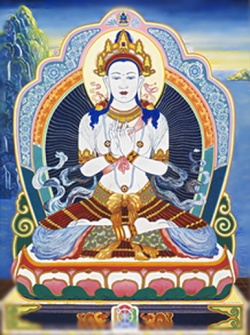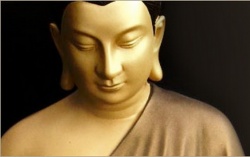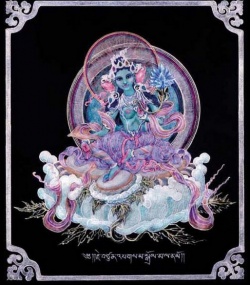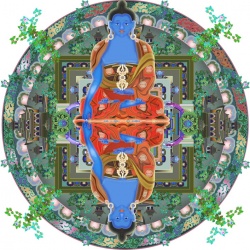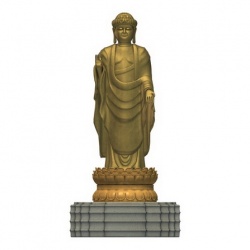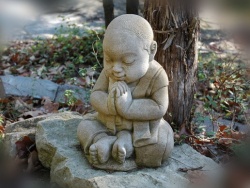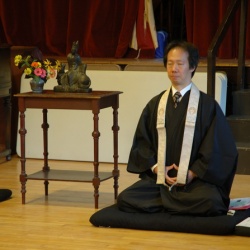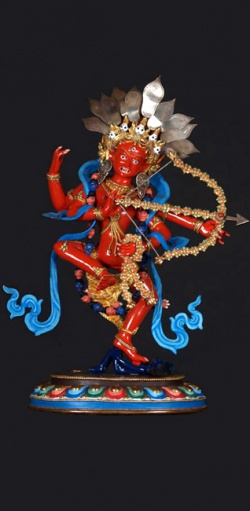Madhyamaka And The Issue Of Theism
By James Standen Taylor
(MA student)
Madhyamaka Philosophy
Nalanda College of Buddhist Studies
(Toronto. Canada)
April 2004
GENERAL BACKGROUND ISSUES
Buddhism appears to have always had an issue with the idea of a Supreme Being in the sense as understood by Theists. Right from the beginning there is an implicit understanding that such a Being is, for all intents and purposes, quite unnecessary. After all, if
attaining a state of enlightenment is something that an individual can accomplish through their own ability and insight, what is really left over for a God to do? If we are truly saviors of ourselves and destroyers of ourselves, as the Buddha intimated near his death,
the most a deity could do is perhaps give you some kind of aid along the way. This would be no different, in the end, than the aid provided by human friends. Whatever aid is given from any quarter, it is ultimately up to the individual practitioner to take it and use
it in their journey toward enlightenment. Throughout the course of the Buddha’s life, he is the one who takes what is before him, whether advice from deva or human, and is the one who decides and acts. He is not accountable to anyone other than himself for where he
ends up. He certainly gives no indication of owing or relying on a deity for anything.
The closest we come to Buddha owing a god for something occurs soon after his enlightenment. Thinking through what he now understands, he decides that it is probably too difficult for people to understand. The Hindu deity Brahma appears to him and convinces him that he
should share his message. After all, even if many do not understand, some will. So, does the Buddha owe his ministry to the intervention of Brahma? If so, that is not the impression one gets from the text. Brahma is clearly in the position of appearing before a
superior and is humbled to the point of being presented as a beggar, pleading for the Buddha to act. Buddha does not gain anything from Brahma that he does not already have. Brahma does not give him any kind of power, ability, or special giftedness. Buddha is the
Master in this encounter; Brahma the servant.
This servant position is the one taken by all deities as Buddhism spreads. Regardless the culture, the local gods and divine beings are arrayed in pantheons below the celestial beings and Buddhas, though some are reworked as the local manifestations of those beings.
This can be easily seen in the way the native Tibetan and Japanese deities were worked into the Buddhist worldview as Buddhism became an important part of their cultures. Buddha is, after all, not merely named the teacher of men, but of gods, as well. At a number of
places in Buddhist literature the gods are portrayed as proclaiming the Buddha’s greater wisdom, even praising his insight and personal qualities. The gods are shown as ignorant of what the Buddha knows, and in need of instruction from him. The Janavasabha, Mahasamaya,
and Sakkapanha Suttas all portray these types of relationships between the Buddha and the gods.
Beside the fact that a God is not necessary to the accomplishment of the Buddhist goal, such a Being does not really have any place in Buddhist cosmology. One of Buddha’s key insights, some say The Key Insight, is that the entire world and everything in it is in a
ceaseless flow of change. Everything in this state is part of a web of causes and conditions upon which it is dependent for its origin. This has been the case without beginning. Since there was no start to this web of interdependence, there is no need to posit a
Supreme Being as its cause. So much for a Creator deity like the Hindu Isvara.
Not only is there no room for a divine being at the start of things, there is actually no room for him, her, or them any time during the continuing flux of change. Local deities, with small territories of influence, are easily dealt with. They are, themselves, trapped
within the same cycle of samsaric existence as are human beings. They need enlightenment just as much as any human. They will be spun through the endless rounds of rebirth, suffering, and death until they achieve liberation.
However, if that is the case with minor deities, why is it not so for Supreme Beings? After all, maybe they are only thought of as being Supreme Beings due to the perceptions of those trapped in lower realms of existence? Maybe these Great Gods are not everything their
followers proclaim they are? Fundamentally, since humans have filled their world with imagined constructs of thought, perhaps that is all these Gods are, as well. Since Buddhism does not posit personality as part of its ultimate, it would appear to many Hindus to have
secularized Brahma into Nirvana. This leaves Brahma as lower than Nirvana and in a position where it is a mistake to think of Brahma as the Ultimate. This lowering also allows the Buddhist to firmly root Brahma in the realm of the conditioned with other lesser deities;
subject to birth, decay, and death. One modern Buddhist author draws a chart in which he confidently places minor gods in the sensuous sphere and Brahma in the fine material sphere, all well below the formless sphere, and all trapped within the God Realm on the Wheel of Life, subject to the endless realms of rebirth in samsara (Ruhe, 1999, p.104). There is even an amusing story in which a Buddhist monk goes in quest of the gods to have some questions answered. He works his way up through the ranks of the gods, each level professing
its own ignorance, but directing him upwards to the next, sure that they must have the answer. Eventually, the monk makes his way through this entire chain of self-professed ignorance to the top god. However, rather than finding answers he discovers that even the
greatest among gods is ignorant about even His own origins. This deity is basically playing a cosmic Wizard of Oz, keeping everyone else happy that He knows the answer by engaging in a huge bluff. The god finally tells the monk that the only person who knows the
answers to his questions is the Buddha, and he should go back to him for instruction. The gods are basically portrayed as useless when it comes to such ultimate matters.
Of course, there are other arguments used against those who promote the Hindu gods. The Buddha is quite pointed about the unreliability of tradition, teachers who don’t even bother to emulate the moral character of their gods, and the fact that none of them have ever
seen their gods. However, these are sub-points within the wider cosmological issue of how to handle the gods and where to place them. They actually have more to do with the epistemology of how people claim to know about the gods, rather than the metaphysical question
of what they are.
MADHYAMAKA
When we come to the Madhaymikists we find an intense focusing on the issue of how a Supreme God relates to Buddhist thought. The question is brought straight into the heart of issues involving dependent origination and the resultant lack of intrinsic self existence in
things; their emptiness.
Chapter Nine of Santideva’s Bodhicaryavatara, for example, is a discussion of what it means to think properly about numerous issues from the perspective of Madhyamaka thought. Verses 118-125 deal specifically with a concept of God.
Santideva’s basic thought on the topic goes like this. If God caused the world, what is God? If God is just the elements, then why make a big issue about what is merely a word? Call it elements, call it god, who really cares in the end? It’s just a conceptualization.
However, he goes on to point out why he does not believe God can be the elements. If the elements are a) not one, b) not permanent, c) not inert, d) not divine, e) can be walked on, and f) not pure, how can they be God? Santideva is responding to a Nyaya-Vaisesika
concept of God (Santideva, 1988, p.188) that is one, permanent, unchanging, divine, supreme, pure Being. If the elements and the Nyaya-Vaisesika God do not share these fundamental traits, how can one ever think they are the same thing? They are, in fact, quite the
opposite of one another. For example, how can one and the same thing be both permanent and impermanent in the same way at the same time? It is rather difficult to imagine what an impure purity or an inert activity is like.
The one element that the Nyaya-Vaisesika would see as most like their deity would be space. Is not space infinite, unbounded, and everywhere present? Santideva, however, will have none of it. God cannot be space, because space is inert, not active. Well, then, how
about the Self? Maybe the Self is God? No, again. If Buddhist analysis has shown one thing to their satisfaction it is that there is no inherently existing self. How can something that lacks permanent existence be the type of being that this God is suppose to be?
The Nyaya-Vaisesika God is also a Creator God. Santideva is not very impressed with this idea, either. First of all, this God’s proponents claim He is inconceivable. If something is truly inconceivable, however, how can you know anything about it? If He is
inconceivable, how do you know He is really the Creator? Besides, if God is an eternal cause, if He were to create or share being, would that new or shared being not also be eternal? Doesn’t eternal cause manifest as eternal effect? Moreover, if our stream of consciousness is eternal, how could it ever have been created. If they had no start, they had no need for a Starter.
Even worse, since suffering is the result of action, why would God ever create anything? For him to create something, He would have to act. He would be causing Himself to suffer. Certainly a God would know better than that? However, it is even worse: if God created
what is here, then He is responsible for this whole mess of suffering. What kind of God is that? Why bother with Him? On a more metaphysical level, if God is a cause without beginning, how could He ever start to create anything in the first place. Santideva appears to
be hinting at an eternal regress in the character of God. If God has existed forever, then how does one ever cross the eternity of choices in God’s existence to reach the point where He decided to create something?
At this point, we come to a more formally stated argument. If God is not dependent on anything else, He should be creating all the time. What is there to stop Him? God cannot be dependent on anything, however, as He is said to have created everything other than
Himself. If that is the case, why does He not continue to create? This is obviously not what we find in the world. Instead, we find a world of change full of things passing away, not being maintained eternally by the eternal will of an eternal God. So, where is this
God, then?
From another angle, God cannot be the cause of everything else if He is dependent on other conditions. If He were dependent on other conditions, then these conditions would leave Him unable to stop creating. The conditions that condition Him to create would force His
hand, so to speak, and He would just go on creating whether He wants to or not. Again, this is not what we see in the world, and it hardly speaks well of the supremacy of this Being if He is so conditioned. On the other hand, if there were not conditions, there would
be nothing to cause His creating. So, which is it? Does God have conditions or not? Either way, He appears to up the cosmic creek without a paddle with which to create anything.
Well, the Nyaya-Vaisesika may respond, perhaps creation has something to do with God’s desires? Santideva is quick to pounce on this. If God does not desire to create, yet creates anyway, then there is something outside of Himself to which He is subject. God does not,
then, appear to be much of a God. He would also then be conditioned and we are back into the problem in the previous paragraph. On the other hand, should God be creating out of a desire to create, then He is even worse off: He is subject to desire. No Buddhist can
consider a Supreme Being to be one who is subject to desire. This also falls back into the conditions problem. Either way, God cannot be all powerful, as He is subject to something that has power over Him: conditions or desires. If something else has power, particular
over someone, that someone is not all powerful.
Apparently, no matter which way one looks at the major attributes of the Nyaya-Vaisesika God, He is in one piece of self-contradictory trouble after another. This route of argument is hardly surprising, given that Santideva has already tipped his hand in verse 117 that
he considers the web of causes and conditions to be the explanation for everything. The discussion of this God in the following verses is actually his cutting down of the other major competitor to his own explanation of what causes things. In a way, it is similar to
the way the debate has been dichotomized in the West: either God created what is here, or a natural system of cause and effect is responsible for it. One needs to keep in mind that right after refuting a creator God, Santideva also refutes the idea of eternal, self
existing matter in verses 126-137, so his ideas do not perfectly fit a common Western materialism, either.
Santideva seems quite pleased to have sponged away the whole horizon, as Nietzsche would have it, in a mere eight verses. The problem with this type of eternal, creator God, however, runs far deeper when confronted by Madhyamaka thought. If we turn to Nagarjuna’s
Mulamadhyamakakarika, for example, we find God in trouble in pretty much every chapter. He may not be directly named, but He is directly implicit. What is the relationship between God and conditions, both in Himself and between Himself and creation? How does God do
anything? How does He sense anything? How does He relate to form, space, and desire? What is the relationship between His actions and Himself as an Actor? What is His relationship to time and eternity? What is His essence? Does He endure? How? Does He change? What is
His view of Self? At every step of the way, from a Madhyamaka perspective, an eternal Creator God is in trouble.
The whole way through, Nagarjuna is attempting to draw attention to the way we conceptualize things around us, arbitrarily reifying into existence things that are not really there; that have no intrinsic self existence beyond our arbitrary acts of attribution. If
everything is interdependent, as Nagarjuna’s analysis would indicate, how can our conceptualizations of God escape?
To give a simple example, is God an intrinsically self existent Creator? If so, then Creator can exist independent of creation. If that is the case, why call something a Creator that has not created? They are obviously different things. At the same time, they cannot be
the same thing, as a cause cannot exist at the same time as its effect, or they would not be related. If the effect already exists, it doesn’t need the proposed cause. A Creator God can be neither completely different from nor completely the same as His creation. The
obvious path to chart is the Middle Way between the extremes of eternal creationism and utter nothingness: causes and effects as we understand them their conventional senses are mutually interdependent upon each other. If so, then the supposed Creator is merely another
cause or condition in the on going web of causes and conditions. He is not supreme, independent, or any of the other attributes given to Him by His followers to try and verbally raise Him above the realms of cyclical existence. In fact, He is nothing but another label,
more verbiage used to dress up reality into something it isn’t in order that we can create yet another false refuge from suffering. There is, in reality, no Ultimate, Personal, Creator, God, just causes and conditions empty of intrinsic self existence. The sooner we
stop clinging to such metaphysical baggage as a God and, instead, turn to contemplate the lack of inherent existence in things, but not in a nihilistic sense, the sooner we will see things as they really are and be free from the suffering caused by attachment to mere
conceptualizations.
Given the entanglements caused by even this most basic of attributes normally given to a God, how can He escape the web of causes and effects He is implicated in regarding His other attributes and actions? In light of His relationships with His own thoughts, desires,
and will, as well as His placement in metaphysical time and space, how can He be self-existent? If Nagarjuna has shown that nothing encountered by humans has intrinsic self existence, how can God exist in the way He is conceived by groups like the Nyaya-Vaisesika? How
can He have any real endurance or real selfhood?
IS ALL OF THIS APPLICABLE TO THE CHRISTIAN GOD?
To anyone familiar with Christian conceptions of God, there is obviously a lot of overlap with certain Hindu groups. However, at the same time, there are differences that are not always noted by Buddhists in their attempt to transfer Buddhist critiques of Hindu gods to
the Christian one. The Madhyamikist needs to be careful not to paint himself into a corner where he can be wiped completely off the floor with the simple accusation of having created a straw man, or a Straw God, as it may be in this case. It hardly accomplishes much to
create a prolonged criticism of God only to have the Christian reply that they do not believe in that God in the first place. Let’s retrace our steps at this point to see if they are still firm in this other context. In order to keep some kind of boundaries on this
context that can be reasonably handled, though, we will restrict the discussion to a historically orthodox Christian position that is largely based on the thought of the medieval theologian Thomas Aquinas. His thought is remarkably similar on the surface to Madhyamaka
thought. One finds in reading him the same forest of problems surrounding change, contingency, infinite regresses, and intrinsic self existence that one finds in Nagarjuna, though to different ends and handled in different ways. Relatingare developed.
Another place to see this in the process of unfolding is in the writings of Paul Williams, the well known University of Bristol scholar who converted from Tibetan Buddhism to Catholicism a few years ago. His reasons for doing so are heavily Thomist (Williams, 2002), to
the point that he has become a Dominican, the same order as Aquinas. He has an analysis of what a Buddhist-Thomist encounter could be like being published in June 2004 in James Fodor’s Aquinas In Dialogue: Thomas For The Twenty-First Century from Blackwell Press.
Thomism being the cause of this turn is hardly surprising when you realize how deeply Madhyamakist the Tibetan teachers are and how similar are the topics discussed with Thomas’ agenda. In fact, the one Catholic missionary who made a real splash in Tibet, the
Seventeenth-Century Jesuit Father Ippolito Desideri, did so because of his Thomist approach. He wrote a book in Tibetan analyzing Tibetan Buddhism from a Thomist perspective, which he felt effectively refuted it. The issues were to be formally debated, but the debate
never happened due to the political upheaval of the times. The work was lost, but then rediscovered just over a hundred years ago in Europe and is currently being translated into English in Britain as part of Elaine Robeson’s Doctoral program. It largely revolves
around the same issues that bother Paul Williams.
01) Would a Thomist think that God is not relevant to achieving Nirvana?
I think the Thomist would agree with this. It seems that the only way this causes a conflict is if one assumes that Nirvana and Heaven are the same thing. If Nirvana is something that can be experienced through unaided human effort and insight, for the Thomist it would
obviously not be the presence of God. From the Buddhist side, I don’t think this is being put forward as a serious argument against God, but as an observation that He doesn’t need to be consulted to achieve Nirvana. It says nothing about whether God exists or not.
02) Would a Thomist agree with the idea of placing God within a Buddhist cosmology?
Here is our first major disagreement. Buddhists typically place Yahweh (the Christian deity) within the God Realm on the Wheel of Life. One can see this in Ruhe’s diagram referred to above. As such, the Buddhist is actually claiming that Yahweh is really just a torqued
up deva, like Brahma. Since devas are subject to birth, decay, and death, as well as other imperfections, the Thomist will immediately claim that the Buddhist has set up a Straw God and is no longer dealing with Christianity. Thomists are quite clear that their god has
no beginning, does have eternality, and does not die. He is also considered to be maximally perfect. Since He does not share the traits of a deva, He cannot be merely a deva. He must be something else. It is that something else at which Madhyamikists must refocus their
analysis.
03) Would a Thomist agree that Yahweh has no place within the web of causes and conditions?
Well, yes and no. Like a number of issues this paper raises, this would require an entire other essay to properly explain. The Thomist would agree that Yahweh is not within the web of causes and conditions in the sense that the Buddhist is thinking. Their God is
radically distinct from His creation. Where creation is limited, contingent, finite, and changing, God is quite the opposite. He is not trapped within the realm of the contingent. At the same time, this transcendence is balanced by a claim to immanence, in which God is
present everywhere in creation as the One who sustains it so that the web of contingent causes and effects can continue to operate. Were He to not do so, everything would collapse into nothing. This position raises some obvious questions that a Madhyamikist would like
answered about how such a Being can interact with a creation which He is so radically different from, but that is another set of questions from a level above this one.
04) Would a Thomist agree that tradition is unreliable, hypocritical religious leaders have no right to lead, and that no one has seen God?
Again, yes and no. A traditional Catholic Thomist would disagree that tradition is unreliable. They believe that the tradition handed down through the Catholic Church has been guarded from error, and that is that. Many modern Thomists, particularly non-Catholic ones,
would say their tradition is reliable, but that one does not merely need to accept that. Like the Buddhist offer to come and taste the pudding for yourself, they will also say that anyone is free to respond to the Christian invitation and see that it has real results.
Regarding hypocritical leaders, they would agree. As for no-one seeing God, they would agree that no-one has seen God in His raw divine essence, which is hidden from humankind, but thousands saw Jesus Christ, whom they consider to have been God come to earth. Again,
this raises a second level of questions that go beyond this paper; particularly revolving around the claim of an incarnation. Mulamadhyamakakarika 27:15-18, though aimed apparently at the Hindu notion of humans achieving divine status, could be turned around by a
creative Madhyamikist to question how a divine being could achieve human status, and be both divine and human at the same time, as Thomists claim Jesus is. This question was raised by educated European Pagans, as well, so it would not be an unforeseen objection, nor
would it carry the day without response.
05) Would a Thomist agree that our ideas about God are nothing but mere conceptualizations.
On the one hand, they would agree that everything said about God is subject to the limitations of human conceptualization. (In fact, many would go so far as to say that we would not even know Yahweh existed if He did not chose to reveal Himself to us in creation, the
Bible, Jesus Christ, and the work of the Holy Spirit in the lives of people. Apart from that, Yahweh is completely unapproachable or discoverable by unaided human activity or insight.) They would have sympathy for the Madhyamaka position that words conceal as they
reveal, and are thus not perfect tools for talking about higher reality. Thomists are famous for their stance that the gulf between the conventional and non-conditioned, to borrow Buddhist terms, can not be understood through a univocal use of language, but must be
handled via analogy: words tell us something accurate, but not complete. There is always some level of inaccuracy even when words are used at their best. In a strange way, they take a linguistic Madhyamaka Middle Way. Is God the same as our conceptions? No. Is God
completely different from them? No? Language is neither eternally set nor annihilated in discussing God, but has an analogous fluidity that allows understanding without complete comprehension. While Thomists are well known for what they have positively said about God,
it is often overlooked that they were not averse to defining God negatively by what He is not. Again we see a similar thing in Buddhist thought, where Nirvana is defined in some cases positively, in others negatively, and often, particularly in Madhyamaka, with an
understanding of the limits of language. Given these parallels, I don’t know that a Buddhist would want to poke at this issue a great deal, as pretty much anything that is said critically about the analogous use of language by a Thomist can be thrown back in the
Buddhist’s face regarding their use of language regarding Nirvana. Then again, perhaps there is a deeper agreement even in that.
06) Would a Thomist believe that God is the elements, particularly space?
No. Thomists are very clear that God is not the same as anything in creation. Also, while they believe that God is completely present at every point in space, He is not space itself. Yahweh is simple in essence, without components that can be spread out over space.
07) Would the Thomist agree that God is inconceivable.?
This is very close to question 05. Yes, if understood as completely and utterly conceivable by the finite human mind. No, if understood as the idea that humans can have no ideas about God without any accuracy at all. They also believe that God has spoken directly to
people who recorded their encounters. The things God revealed about Himself in these encounters are accurate as far as they go, without giving comprehensive understanding. Since God is simple, His attributes are a unity in diversity that co-inhere and reflect on each
other similar to the Buddhist idea of Indra’s web. It is thus impossible for any word to do Him full justice, as anything said must be understood by everything else that could be said, and since we don’t know all that, we will never have complete understanding.
Thomists use analogous language to bridge conceivability and inconceivability with the partially understandable. In a sense, this is Thomist conventional talk. Given how much ink Buddhists have spilled talking about their inconceivable Nirvana, I wouldn’t want to poke
away at this point too much. It might poke back.
08) Would a Thomist agree that God, as an eternal cause, must eternally create eternally existing things?
This is a good example showing how one needs to be careful when reading Thomists and Madhyamikists side by side. When the latter talk about eternally existing things, they mean eternally existing in and of themselves. The Thomist does not mean this outside of God. For
them, anything that continues to exist for any amount of time is completely dependent on the sustaining will of God, regardless of whether it is a moment or a thousand years. They would say that since Yahweh is not an impersonal force, He has choice over what He
creates. He is perfectly free to create something that is less than what He is. There is nothing forcing Him to create things that have the same essence as Himself, so there is no reason that He must create eternally self existing things. In fact, since God is
perfectly and maximally eternal, there cannot be another being that shares that trait, or God would lack the perfect maximal eternality the Thomist claims. Since Yahweh can chose, there is nothing forcing Him to create all the time, though there is a sense in which He
is involved in a continual creation through sustaining creation moment by moment.
09) Would the Thomist agree that there is no beginning to the sequence of causes and conditions, thus no need for a Creator; that the cycle of causes and conditions is a sufficient explanation for itself?
Given the modern Christian emphasis on a definite creation moment since the discovery of the Big Bang and Einstein’s equations linking the beginning of space and time, it may seem surprising to realize that Aquinas was not sure about this. It is why he created two
different forms of his famous cosmological argument: one for if there were a beginning and one for if there was no chronological starting point. Aquinas’ arguments, if valid, mean that there would have to be an absolute essence to ground contingent being, regardless
whether or not there was a beginning of chronological time. Modern Thomists have carried this argument forward, but more emphasis has been given currently to arguments that there was a beginning of space-time. This is usually coupled with arguments about the
impossibility of crossing an actual infinite, the same problem as an infinite regress, but in reverse. Thomists would thus not agree that the cycle of causes and conditions are sufficient to either ground themselves or escape the charge of being an infinite regress.
Given the central place of this topic to both Thomas and Nagarjuna, though both take it in almost opposite directions, this would be a certain flash point in any actual encounter between the two communities. The coupling of Thomas’ cosmological arguments with the
infinity problems (Kalaam cosmological argument) has been most fully developed by William Lane Craig, their most well known modern exponent. His upcoming Creation Out Of Nothing: A Biblical, Philosophical, and Scientific Exploration, Baker Academic, 2004, will be his
current statement. While this may seem rather arcane, it has become a very common Christian stance, due to its value in countering Western atheism, leaking down to a common readership in the church, so Buddhists can expect to have to deal with it in even non-academic
settings. Craig, for example, was interviewed by journalist Lee Strobel about these issues in his best selling book, The Case For A Creator (Strobel, 2004) which also outlines other typical arguments a Buddhist will confront. Madhyamikists should be careful how they
handle this, as if they are going to proclaim that things cannot be their own cause, the Thomist will be quick to apply this to the whole cycle of causes and conditions: how can contingency give rise to contingency?
10) Would a Thomist agree that in creating God caused change, thus suffering, in both Himself and creation?
The Thomist God is immutable and does not change. As pure actuality, He has no potentiality. When time and space manifest in creation, there is no change in God. His decision to do so is from a non-sequential eternal state from which He wills to create. That non-
sequential state of creating then unfolds in sequential time, similar to how a doctor may prescribe your health in one moment of giving a prescription that will take place over many weeks, to borrow an analogy from Geisler. Since God’s attributes are expressed in full
actuality in this eternal state, they do not change. As they are his essential nature, He does not change. What changes is the non-essential relationship contingent beings have with their creator. As for being responsible for the suffering in creation, Thomists would
deny this on a number of grounds that have been deeply worked out over the past near millennium, but of which Buddhist seem largely unaware. Rather than deal with them, most Buddhists seem content to make the above complaint without elaboration and showing little
acquaintance with the relevant literature. Madhyamikists will need to catch up to the current discussion, which is a great many points and counterpoints beyond the simple claim that if God created everything, He created suffering. The majority of statements I have seen
in Buddhist literature are not going to move a Thomist, except to perhaps suggest a reading list.
11) Would a Thomist agree that since God has existed eternally, there is no way to reach the point at which He chose to create?
This chestnut was raised by European Pagans as part of the problem of what God was doing before He started creating. It resulted in Augustine’s tongue-in-cheek response that God was working on Hell for people who raise such questions! Augustine’s serious response was
adopted by Thomists, but it is a little tricky. In Thomist thought, eternity is not numerical; it is not achieved by adding one thing to another until eternity is achieved. Thomists would actually deny that is possible. Eternity for them is a state without parts or
division. God creates from an eternal, non-sequential state, so they would say that the comparison being drawn by Santideva is a category confusion, if applied to Yahweh. There was no time before time, so nothing sequential to cross to get to the point of creating.
12) Would a Thomist agree that we don’t currently observe a world that seems to be the result of an eternal creator?
Thomists would partly agree with this, because they believe in an event identified as the Fall, by which there has entered into creation a certain disjunction between what God directly wills and what He allows. Things are not running exactly as they would be if
everyone were with the program, so to speak. The more direct Madhyamaka point, however, seems to be that you would think a self-existent being would make a self-existing creation. This has largely been dealt with above in question 08, though it would bleed into their
answers regarding the existence of suffering, if we had space to outline them.
13) Would a Thomist agree that in creating God must be subject to either something either outside of Himself or inside of Himself making Him create?
Thomists would see this as a variation on another old European Pagan chestnut: is what God wills good because either he says so (thus it is arbitrary) or because of some standard of good (which he would have to be subject to)? The Thomist God is subject to nothing
except Himself. There is nothing outside of Him that can make Him do anything. As for his will and desires, they are one with His being and attributes, thus essence. Yahweh does not do because of something, He does because He is something. Similarly, He does not exist
because of something, but because He is existence itself. The concept of cause is irrelevant to Him, as He is neither caused by another nor by Himself. He just is. When confronting Moses, Yahweh identified Himself as I Am. This obviously lands us straight in the center
of what could be an interesting Thomist-Madhyamikist dialogue on intrinsic self existence.
WHERE DOES THIS LEAVE US?
At a minimum, the above has shown us that while the Madhyamaka approach is quite powerful within the cultural sphere from which it originated, one cannot assume a safe transition to other contexts without careful adjustment. The above Thomist positions are merely the
opening step, on a simple level, that they would make. The Madhyamikist would have responses to them, and the Thomist would make counterpoints. The discussion would go for quite a number of rounds on almost any one of these issues. As suggested above, a perusal of a
modern Thomist’s writings, such as those by Geisler, by a Madhyamika with their eyes open would easily show the trajectory the discussion would take.
In order to move their thought into a current encounter with Thomism, or even most contemporary traditional Christianity, Madhyamikists will have to spend time to make sure they actually understand this God who is quite different from Hindu deities. They will need to
par out, or adjust, the traditional arguments to account for these differences, and come up with new ways to apply and explain the Madhyamaka points and their relevance in this alternative theistic context.
Let me give an example of an interesting question Madhyamikists could hone in on: how does an immaterial God effect a material creation? How does He get it to do His will? How does He “move” it, so to speak? Thomists are quick to point out that He does so through the
power of His word, but what does that actually mean? They will go on to define what God is and is not in this context, but you seem to end up with God on one side and creation on the other, with words covering the gap in between. These words give the appearance of
being an explanation, but do they really refer to anything? They seem to be a mere outline of a very vague process. The Madhyamaka analysis of cause and effect, as well as action and actor, could be brought to bear on this weakly conceived area with some effect. I
think Thomists could muster a response, but it seems from the literature to be an area that has not been as clearly thought out as others, and thus a vulnerability. This keys back into what I mentioned in question 03 about a Madhyamikist having further questions about
how this type of Being can have an effect within the web of causes and effects without being contained within it.
What would make the Madhyamikist-Thomist encounter so interesting, however, is how much overlap the two would encounter. Thomists would likely see the Madhyamaka definition and explanation of conventional reality as referring to what they mean by contingent creation.
Given the way contingency is handled in Thomism, there would likely be a lot of agreement and mutual back patting. The way intrinsic self existence, contingency, infinite regresses, and cause and effect work together in the overall way things are argued on both sides
is eerily familiar. There are lines, even paragraphs, in Geisler’s work, for example, which could be effortlessly dropped into the middle of some translations of Nagarjuna’s writings and you would be hard pressed to tell whose words they actually were without having
access to a wider context.
The root of the big divide, however, would come over the action of an intrinsically self existing being within the flow of cause and effect. Note, I didn’t say over the mere existence of such a being, as long as He does not interfere within that flow. In the latter
case, what Thomists say about God, and how they do so, finds constant echoes in what Madhyamikists say about Nirvana, and how they do so. If either side poked around too much here, they would find their words quickly bent back upon themselves; a classic case of one
finger pointing at the other while three are pointing back at yourself. The real flash point is whether or not such a being could be a Person and act such as to have an effect within the cycle of causes and effects without being sucked into it. Things might end up
devolving into the Thomist repeatedly defining His God one way, and the Madhyamikist responding “that’s not possible,” with both sides accusing the other of self-contradiction!
Either way, the flow of information does not need to all go one way, for example, from Madhyamikist critique to Thomist clarifying. There doesn’t seem to be any reason why a Madhyamikist could not thieve some of the ideas Thomists use. As noted above, one problem
Thomists would have with Madhyamaka thought, and Buddhism in general, is this cycle of causes and effects going on forever. How could we ever get to this point in the cycle if it has gone on for infinity past? Thomists avoid a similar problem within God by advocating
that He exists in a non-sequential state. If that is fair, then why can’t the Buddhist appeal to the same thing in Nirvana, which also lacks a sequential state? The infinite regress problem in conventional reality is just another example that there is ultimately
something wrong with conventional reality as it is normally perceived. What was seen as a weakness in the theory, becomes a clue to look for a higher explanation. Thus, just as the old infinite regress of turtles becomes centered on gravity at the core of the earth,
the old infinite regress of time becomes centered, like a great wheel, on the more fundamental understanding of Nirvana and emptiness. What is understood conventionally about time is the rim of the wheel, with an accurate understanding of time radiating along the
spokes of emptiness to the emptiness of emptiness at the hub. Of course sequential time is empty of self existence. Understood properly, what sequential chronology of the past has ultimate existence? None. Conventionally there is a past, but the infinite regress
problem shows the conventional view is not complete.
Another clue that it may not be complete is the problem that results for my chances of achieving Nirvana at any time in the future if I have already had eternal past time to do so. If I have already had infinite time to realize Nirvana, I have had all the time needed
to do anything to have this realization. In an eternal past, all possibilities have had time to be realized. Yet, here I sit, somewhat doubtful that I am enlightened. How can any amount of future time change this situation? If I have not already achieved Nirvana with
the resources of infinite time, why is more time, even an infinity of it, going to make any difference? It doesn’t appear to be something I am capable of doing or, with eternal time and its infinite resources and possibilities, I would have done it already!
Of course, it is just as easy to respond to the problem by saying that Buddha was a human and on this point, and that of oscillating universes, he was wrong. That doesn't mean that everything else he taught was inaccurate. If one wishes to be more Madhyamaka, they
could maintain that he knew better, but was exercising his right to skillful means in teaching the Two Truths, merely adopting Indian cosmological views for the sake of argument without agreeing with them. In that case, it isn’t his fault that later Buddhists mistook
this as positively teaching an eternal past time. According to Mahayanists, early Buddhists mistook many things. What could a Thomist say? All the Buddhist has done is exactly what Thomists claim God does when He condescends to speak to us in language we will
understand. As a result, the Big Bang would be the resolve for an infinite regress of time, and Einstein’s theories would ground the understanding of time with that of space. This would be more evidence for Nagarjuna that the earlier Buddhist stance on space as a
dharma similar to Nirvana is inaccurate.
[James Taylor. Email: jim050@sympatico.ca]
Bibliography
Bourke, Vernon. The Pocket Aquinas, Washington Square Press, New York, 1960.
Bray, Gerald. The Doctrine of God, Downer’s Grove, InterVarsity Press, 1993.
Copleston, F. C. Aquinas, Penguin Books: Montreal, 1955.
Davis, Stephen. God, Reason & Theistic Proofs, Grand Rapids: Eerdmans, 1997.
Dharmasiri, Gunapala. A Buddhist Critique of the Christian Concept of God, Golden Leaves, Antioch, 1988.
Garfield, Jay L. The Fundamental Wisdom of the Middle Way, Oxford University Press, New York, 1995.
Geisler, Norman. Thomas Aquinas, Baker Book House, Grand Rapids, 1991.
Hopkins, Jeffrey. The Precious Garland, New York: Harper & Row, 1975.
Houshmand, Zara. Consciousness at the Crossroads, Snow Lion Publications: Ithaca, 1999.
Huntington, C. W. The Emptiness of Emptiness, Honolulu: University of Hawaii Press, 1989.
Kalupahana, David. Buddhist Philosophy: A Historical Analysis, Honolulu: University of Hawaii Press, 1976.
Kawamura, Leslie. Golden Zephyr: Instructions from a Spiritual Friend, Dharma Publishing, California, 1975.
Kreeft, Peter. Summa of the Summa, Ignatius Press, San Francisco, 1990.
Ramanan, K. Venkata. Nagarjuna’s Philosophy, Motilal Banardsidass Publishers: Delhi, 2002
Ricard, Matthieu & Thuan, Trinh Xuan. The Quantum and the Lotus, Crown Publishers: New York, 2001.
Richards, Jay Wesley. The Untamed God: A Philosophical Exploration of Divine Perfection, Simplicity and
Immutability, InterVarsity Press, Downers Grove, 2003.
Ruhe, Brian. Freeing the Buddha, Third Edition, Buddhist Spectrum Study Group: Vancouver, 1999.
Santideva. The Bodhicaryavatara, Oxford University Press: New York, 1998.
Story, Francis. Gods and the Universe in Buddhist Perspective, Buddhist Publication Society, Kandy, 1972.
Streng, Frederick. Emptiness: A Study in Religious Meaning, Nashville: Abingdon Press, 1967.
Strobel, Lee. The Case for A Creator, Zondervan Publishing House, Grand Rapids, 2004.
Williams, Paul. Mahayana Buddhism: The Doctrinal Foundations, Routledge: New York, 1993.
___________. The Unexpected Way: On Converting from Buddhism to Catholicism, T&T Clark: New York, 2002.
A Basic Outline of Norman Geisler’s, Systematic Theology V.2, (Bethany Book House, Bloomington, 2003) Emphasizing Areas of Interest to a Madhyamikist.
030-037- discussion of God as pure actuality with no potentiality. Also covers the relationship between
contingent and necessary being, and how God can act in a changing world if He lacks potentiality.
039-055- discussion of God as simple in essence and not a composite being. Also covers how God can have
different attributes that are also one essence.
058-064- discussion of God as having intrinsic self existence. Also discusses difference between being a self-
caused being and an uncaused Being.
064-072- discussion of God as a necessary Being, contrasted with a contingent being. Also addresses how this
can have any meaning when we have no general experience of non-contingent things.
074-092- discussion of God as being unchanging in His essence. Also addresses how an unchanging God can
have any meaningful relationship with, or knowledge of, a changing world.
093-109- discusses God as being eternal. Also covers what Thomists mean by a non-numerical eternality, as
well as how He can be involved in temporal events without being part of the temporal realm
112-123- discusses God as not having changing passions. Defines what Thomists mean by passion, an
important point given Buddhist criticism of desire.
124-134- discusses God as being infinite in the sense of not having limits typical of finite things. Addresses the
idea of God not having an infinite sequence of moments in His being, and the impossibility of there being more than one infinite being.
137-156- discusses God’s relationship to matter and space.
170-178- furthers the discussion on God’s relationship to space.
245-246- some comments of interest to God’s inconceivability.
254-261- discussion of God as a living Being and the source of life. More on His non-composite nature.
261-264- comments on God as being immortal and not subject to decay or death
264-271- discusses God as being a unity.
278-294- discussion of God as also being triune, yet without contradicting His unity. Covers what Thomists mean
by essence and person.
314-323- describes God as holy, thus separate from contingent creation.
323-405- covers what Thomists mean when they attribute righteousness, jealousy, moral perfection,
truthfulness, loving kindness, mercy, and wrath to God.
429-506- extensive discussion of God as the creator of contingent reality. Gives attention to God’s relationship to
creation as cause, whether or not nothing comes from nothing, the relationship of creation and time, how
an eternal cause can produce a finite effect, and how a non-material cause can have a material effect.
518-526- explanation of God’s transcendence beyond contingency.
527-534- discusses how God is immanent with creation without being part of it.
536-543- discussion of God’s sovereignty over contingent reality.
563-576- outline of how God sustains the ongoing existence of contingent reality.
